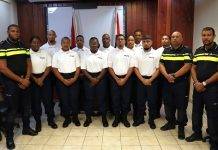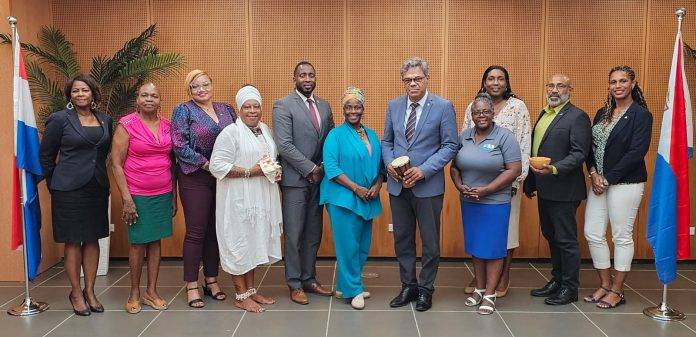GREAT BAY, Sint Maarten (DCOMM) – On Tuesday, May 28, 2024, the Advisory Committee on Slavery, Atonement, and Reparations (ACSAR) had an introductory meeting with the Council of Ministers (CoM).
The meeting commenced with an honorary session dedicated to the ancestors of Sint Maarten, with the ritual performed by Nkosazzana Illis. Following this, the committee members explained the manner and reason for the Committee’s establishment and emphasized the importance of discussing slavery. The Committee was established by Ministerial Decree in 2023 to address the questions of reparations and the legacy of slavery.
For over a year, the committee has been holding weekly meetings, volunteering their time for a greater cause. A work plan was created, which includes workgroups and subcommittees, each focusing on specific areas. Despite the availability of funds, the lack of full-time capacity to have a dedicated individual support the Committee, has hindered the utilization of these funds.
Prime Minister Dr. Luc Mercelina emphasized that the history of slavery is one of the pillars that helps us become more conscious and aware of our identity as a people. There has been a lack of tangible engagement with our past and confronting it with concrete evidence allows for a deeper understanding and realization.
A comparison was made with the effects of World War II, which are still tangible today in each country impacted by it. The Prime Minister further indicated that the intended National Slavery Museum in Amsterdam should be renamed the Kingdom Slavery Museum, as the matter is a Kingdom issue, not solely the Netherlands. The importance of a Kingdom-wide conscientization project to raise awareness was highlighted.
Prime Minister Dr. Luc Mercelina tasked Clara Reyes, as head of the Culture Department, with drafting a vision plan, verbalizing the explanation provided during the meeting with CoM, among which the importance of involving not only the government but also private stakeholders in the process was stressed.
The vision plan will ensure that necessary action steps can be taken in the overall conscientization process. The Committee also highlighted the importance of incorporating Sint Maarten’s history into the school curriculum as one element that can create a sense of identity and belonging.
This initiative will foster a greater understanding of our shared history and ensure that future generations are more informed about the legacy of slavery and its impact on our society. Additionally, it can encourage students studying abroad to return home, contributing their knowledge and skills to the development of our community.
The ACSAR was thanked for their input and insights. The Council of Ministers recognizes the importance of healing and awareness in the slavery process and supports the strides being made by the Committee towards reparations and reconciliation.
Present in the meeting were President of the ACSAR, Rogelio Voges (virtual), Vice-President Clara Reyes, and members Antonio Carmona Baez, Oldine Bryson-Pantophlet, Nkosazzana Illidge and Marcellia Henry.






























